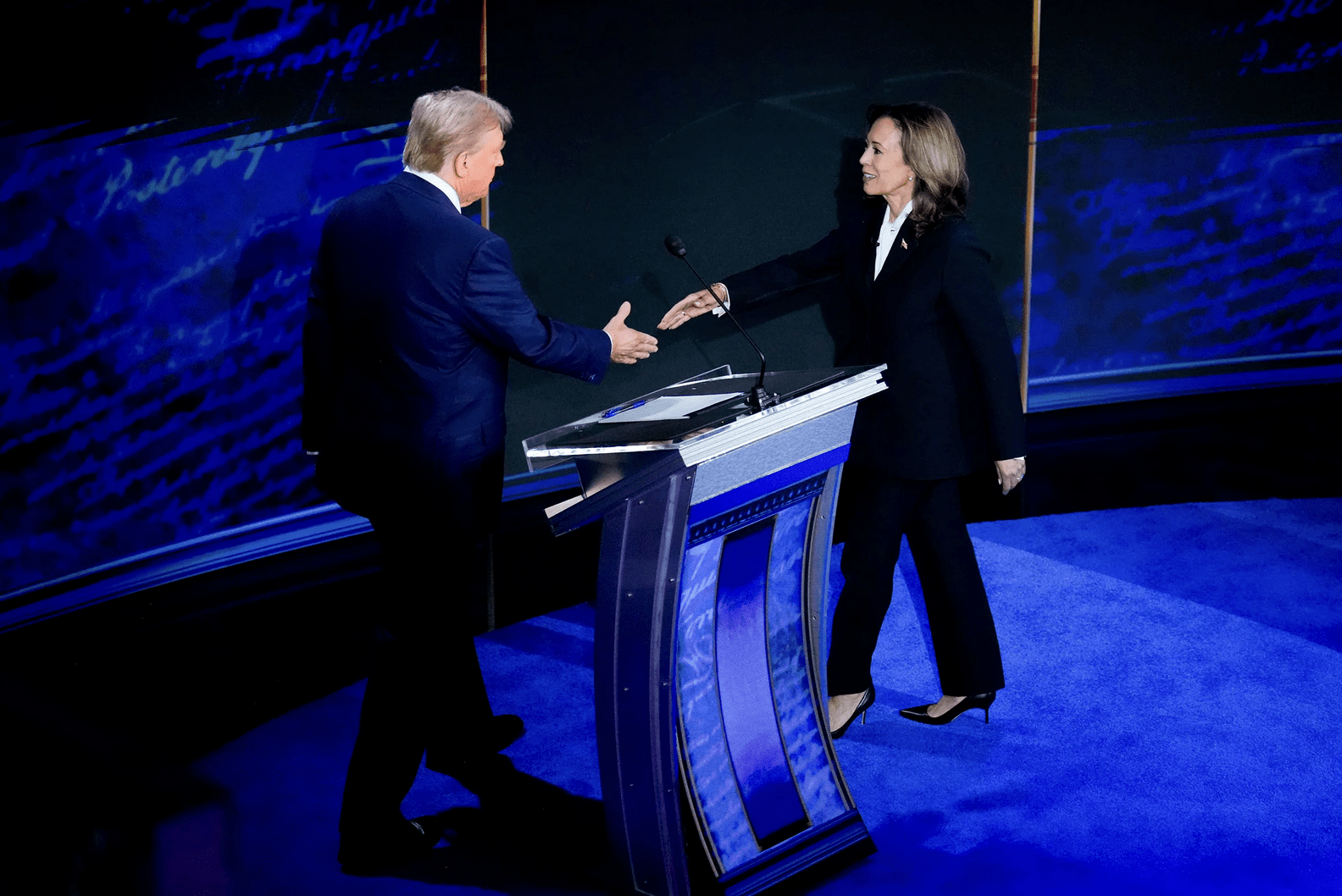Policy Conversation: Delacourt & Shelling on the Stark Debate Divide
 Counsel PA
Counsel PA
Welcome to the latest in our series of Policy Conversations between Counsel Public Affairs Senior VP John Delacourt and Counsel PA Account Director Will Shelling about the 2024 US presidential election. John is a veteran Liberal strategist, longtime Policy contributor and novelist, and Will is a Vegas-raised, Vancouver-based NDPer. This is their third exchange in the series.
September 13, 2024
Will Shelling: John, I think this was probably the first debate I watched where I wasn’t shackled with despair. I think we saw two very different ideas of who could govern the United States. Harris provided a perspective of hope and freedom from fear, whereas Trump sought to feed on the fears of Americans. One candidate gave clear examples of policy and how that can be moved, and the other provided conspiracy theories that I don’t want to bother explaining.
We should start somewhere, what was your take on the debate?
John Delacourt: Will, I think you’re absolutely right about the stark divide that was affirmed with this debate. We’re writing this after a deluge of takes on this event, with an overwhelming consensus forming about Harris’s victory. There’s been a lot of perceptive commentary on why she won, but there is one reason that stands out for me: Harris and team approached this battle as if Trump was the incumbent. I think that virtually every line of attack that will prove to resonate with voters before E-day was not based on any particular platform plank of the current Trump campaign. And tellingly, there was little policy discussed at all. Harris provided Americans with her critical review of the lowlights of Trump’s time in office. In that sense, Harris had an advantage that Hillary Clinton did not. It was a masterful framing of challenger versus incumbent. And at the risk of being pedantically consistent, I think that the US election will be no different than the UK’s or our own: the perception of incumbency – rather than literal or actual incumbency — will prove to be the albatross that can’t be shaken off. Harris and her team should be credited with how astutely they’ve read this. The first Trump mandate may have been a tragedy for the Democrats, but any second one now looks like a farce for all Americans.
Shelling: The other benefit of casting Trump as the incumbent: She was able to establish her brand as something new and exciting. For many Americans who aren’t clued into the election, this was basically the best first impression you can give, save for some people who believe her facial expressions were too “animated”.
Delacourt: On one last note on incumbency, the Democrats have found an opportunity by overturning what could have been decisive strengths for the Republicans: the clarity and simplicity of Trump’s dystopian vision of an America besieged by “illegal aliens” eluding border controls. That song sounds just so 2020 now.
And speaking of songs, I’m not even close to conversant on the Taylor Swift phenomenon, but – and I say this with all seriousness — her endorsement of Harris right after the debate could be a very big deal. Do you think the Swift effect will be significant for Harris-Walz?
Shelling: Speaking pragmatically? It’s going to get a bunch of key voters off the bench in swing states, but it remains to be seen since it’s still early days. It’s remarkable because we’ve seen her impact on voting in September 2023, where a single Instagram story to over 272 million followers recorded over 35,000 registrations. I think it does draw out voters in the Democratic universe who would normally be apathetic. Her post endorsing Harris, which was brilliant timing by the way, drove over 400,000 users to check their registration in the 24 hours afterward. Even if a tenth of those users were eligible voters in the United States, I think Swift and her team have accomplished their goal. She echoed this sentiment at the MTV VMA’s, which have a strong youth viewership.
 NYTimes
NYTimes
Something I want to draw attention to however, is the content of her post itself. She didn’t just provide an endorsement like she did in 2020, with a plate of cookies. There was a distinct twinge of anger and spite here against what Trump and Vance have said, especially against women, in this election cycle. She called attention to the use of an AI deepfake used by Trump’s campaign to endorse his presidential run. She signed off “Taylor Swift, Childless Cat Lady”, echoing the distasteful statements from Vance earlier this summer. She hits on themes of bodily autonomy and gender roles in her post, providing a distinct feminine rage that couldn’t be missed. I think the real power of this endorsement is that it gets women into voting booths, which Harris’ run at the White House needs, especially in key states.
To build off my last question, I want to talk about the implications of this debate for us here, specifically looking at undecided voters. With Trump, I saw someone who was not trying to court those who haven’t decided to vote yet. I saw someone trying to reassert control over his base after facing an onslaught of opposition research and media hits that are portraying him and his running mate as incompetent. With Harris, she spoke directly to undecided voters, using language such as “there is a home for you in this campaign”, and calling attention to the fact that she wants to keep civility in the White House.How do you think these two performances are going to resound with undecided voters in key states? I’m curious, is there anything we can learn from Harris’ choice of language?
Delacourt: This is a really interesting point to me, Will. I think you’re onto something that’s been spoken of less in the reviews of Harris’s performance. Clearly, Harris will not be referring to Trump’s acolytes and/or supporters as a “basket of deplorables”. It’s a common communications tactic, especially with any advocacy campaign, to show that you’re not speaking to the converted, and that you have what’s called third-party validation. Harris and her debate team zeroed in on the best third-party validators to find her swing votes: embittered Republicans. The harshest quotes on Trump’s presidency that she recounted for him came from inside that circus tent. Trump could have blocked those attacks and bridged to what he preferred to talk about but, predictably, these criticisms were about him, not his policies, and wounded his ego. He took the bait. It was brilliant rope-a-dope.
This brings me to my question for you, Will. Given your understanding of the American electoral landscape, do you think Harris can sustain her effective campaign offensive with this approach for the next 50 days? There are fears that the momentum will start to falter, and a tight race will only get tighter.
Shelling: I mean, you’ve got to preach to the choir, it’s the only way you can get them to sing. I think the United States isn’t prepared for their first real snap election, and I think the momentum for Harris is going to lie in deft communications and a very intense ground game with all of the volunteers they’ve accumulated. The electorate is used to election cycles that functionally never stop in the United States. After the presidential elections, you have the midterms. After midterms, you have Senate races. After Senate races, you have things like the school board, municipalities, or special elections. This election gives the US a taste of how elections are run in Canada or the UK, with a drastically shorter run time than what they are familiar with.
I grew up listening to the O’Jays, and to echo them, it’s all about money right now. Harris’campaign had a sizable lead over Trump, standing at $404 million to Trump’s $295 million, tripling the Trump fundraising in August alone. The debate brought Harris $47 million in the 24 hours after the event, and this is likely to grow, especially with Swift’s endorsement and others yet to drop. She’s transferred a large portion of this money down-ballot, focusing on key areas where the Democrats are likely to win, but need support. I think this, paired with the volume of volunteers available, especially in previously Republican-leaning states, can help sustain the momentum.
I’m cautiously optimistic. I think we might have to worry about the Postal Service, through.
Recognized as one of the top 100 Lobbyists in Canada by the Hill Times for five consecutive years, John Delacourt leads the federal advocacy team for Counsel Public Affairs, where he is a Senior Vice President. John served in a number of portfolios in three federal Liberal governments, as well as in communications and stakeholder relations in Opposition. He is also the author of five novels and is a regular contributor to Policy magazine.
Will Shelling is a government relations consultant and New Democrat who specializes in justice, equity, diversity and inclusion. His primary areas of focus are Indigenous affairs, climate change, and Canadian culture. He is also a director for White Ribbon Canada, a national non-profit dedicated to ending gender-based violence by engaging men and masculine people. He was raised in Las Vegas, NV but now lives in Vancouver, BC.
